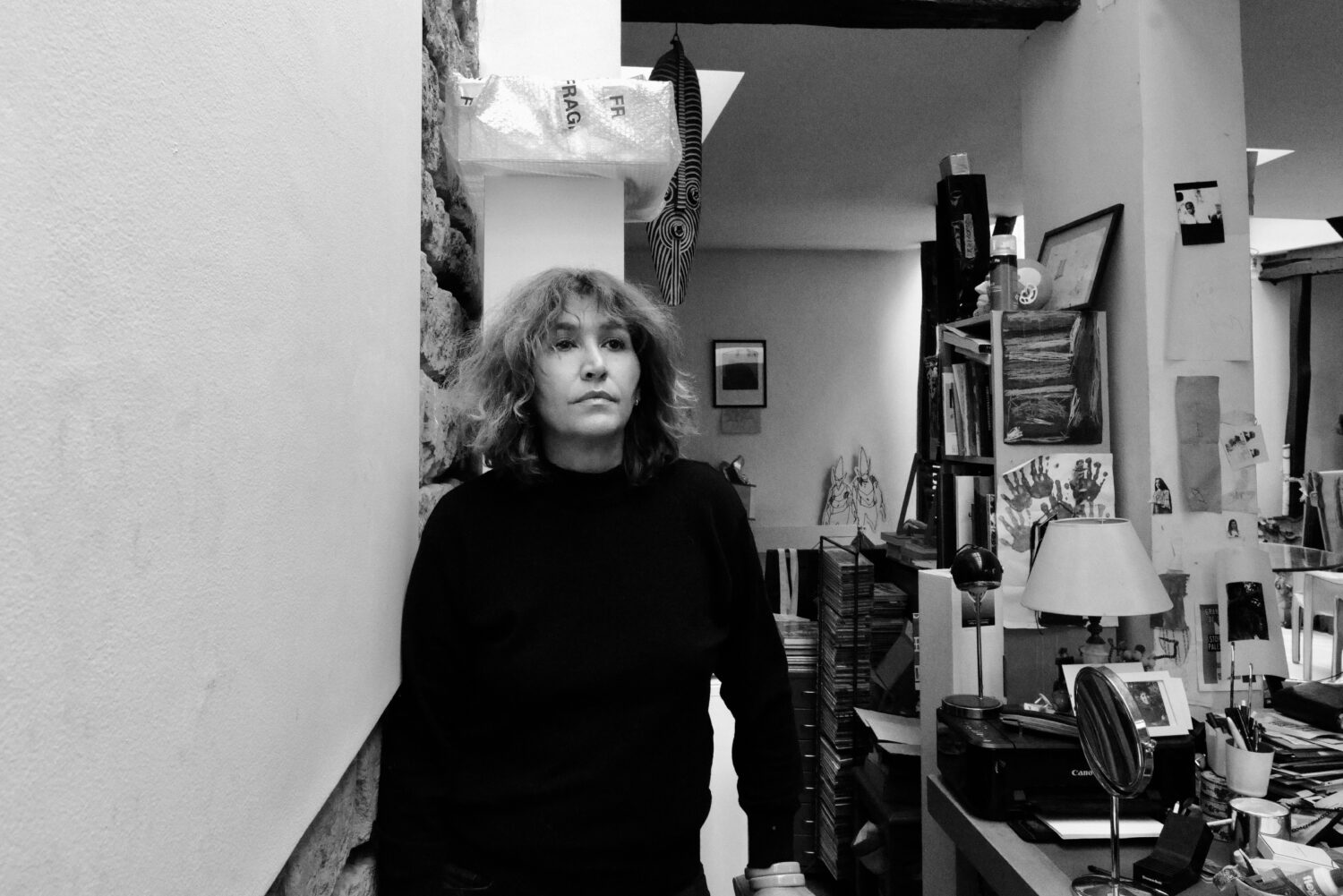Prix AWARE
Louisa Babari © Mathieu Cesar
Louisa Babari inherited a socialist political history which was once shared by the Eastern bloc and independent Algeria, and which she never ceases to revive in her practice of collage, text, sound, and video. Born in Moscow to a mother expelled from the Young Communist League and to a father from Constantine who had come to the Russian capital for his studies, she lived there a few years before arriving with her parents in France, after a decisive – although short – period in Algiers. For years now, L. Babari has worked on ways to reactivate, archive, and rewrite a space-time that she wants to render multiform and multifaceted: that of pan-African and soviet socialist utopias. This plural space involves a critical engagement: it is permanently challenged by the contemporary. But she settles within it as with “friends from the past”1. Between biography and autofiction, her practice navigates poetically between the utopias, deceptions, and aesthetics which continue to haunt our presents long after their disappearing.
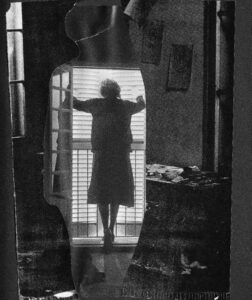
Aesthetics of the Antrum, 2014, Livre, 20,50 x 17 cm, 88 pages © Louisa Babari
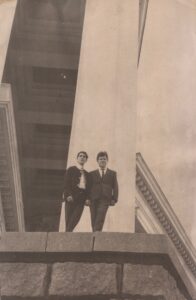
Journal d’un étudiant algérien à Moscou, 2016, video, silent film, 10’ © Louisa Babari
A film-lover, L. Babari strongly recalls the black and white, sometimes silent, films of her childhood2. Traces of this can be found in her collages, where personal archives sit side-by-side with elements cut out of old newspapers and albums. In Aesthetics of the Antrum (2014), “a film on paper” which brings together some 80 collages made between 2009 and 2014, not a single text interrupts the ‘folioscopic’ experience in which living archaeological heritage, architectural traces, panoramic shots gleaned here-and-there, and a few personal photos are intermingled3. She pursues this process, in which, she explains, she “transposes the universe [of traditional cinematography, shot by] shot in a publication of still images”, in A Secret Song (2021), a study of Algeria in the 1970s, a period which mingled hope and violence4. In her work, the sources of images are never dated nor referenced; whether they are easily accessible or rare, the artist uses them all in a raw state. The document is sacrificed and cut for the composition. But when it comes to telling the story of a singular political experiment, through the story of her father, she does just the opposite: in the video Journal d’un étudiant algérien à Moscou (2016), family archives which have been patiently collected are preserved rather than desecrated.
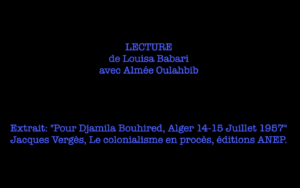
Lecture, 2017, sound piece, 3’21© Louisa Babari
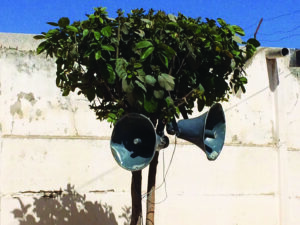
Voix Publiques, 2018, Installation view. Sound installation & Panafrican poetry program, broadcast at Dakar Biennial 2018 © Louisa Babari

Père, 2009, video, 8’© Louisa Babari
L. Babari’s work is therefore two-fold: irreverent, disloyal, she abandons the idea of origin and its myths; she reworks them in a rewriting gesture which displaces and decontextualises the narrative in its multiple layers.
Voix publiques (2018), a sound installation created for the 2018 Dakar Biennial, is a ‘device’ of many voices and languages.5 Classics of pan-African, Soviet, Haitian and Martinican poetry are interpreted by voices which stamp their subjectivites and their presents on the texts. From this “partition”, installed far from the established sites of the Biennial, a cartography of the struggles of the South in eight languages6 emerges and is imposed.7 A collective work, Voix publiques erases the polished contours of militant poetry to let the layers of subjectivity be heard. A similar thing occurs when, in Lecture (2017), the artist has her then six-year-old daughter Almée, who is learning to read, read Jacques Vergès’ plea for Djamila Bouhired.
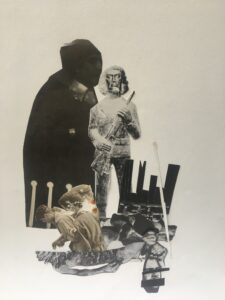
Un chant secret, 2021, black and white paper compositions, pasted on white fine art paper and printed on Hahnemuehle matte paper © Louisa Babari
L. Babari is a translator, but she is above all a filmmaker who does not make films. If her uneasy approach to ruins and to detritus is that of an archaeological dig, her logic is more that of a geological cross-section in all its verticality: she sounds the depths of the faults, folds, overlaps, and discontinuities which structure our deepest imaginations. That which we could read as an archivistic investment in the document would then be read as a multiplying of the layers of subjectivity that haunt us, between the uniqueness of trajectories, cultural hegemonies, militant geographies and a narrative that is always pushed away, held at a distance, in its continuity.
Salma Mochtari
Born in 1969 in Moscow to a Russian mother and an Algerian father, Louisa Babari grew up in Algiers, Moscow and Paris. A graduate of Sciences-Po Paris and the Institut national des langues et civilisations orientales (INALCO, Paris) in contemporary studies, Russian and cinema, she lives in Paris.
In 2014, her work resulted in a publication, Aesthetics of the Antrum (Cabeza de Chorlito). Her works have been shown at the Centre national édition art image (CNEAI) in Chatou, at the Musée des Civilisations de l’Europe et de la Méditerranée (MUCEM) in Marseille, the Raw Material Company in Dakar, the Dakar Biennale, the Bozar in Brussels, the Maison des arts de Malakoff, the Manifesta 13 in Marseille, the Centre national des arts plastiques and the FRAC Centre-Val de Loire in Orléans.
She occasionally contributes to art and opinion magazines (Analyse. Opinion. Critique, Something We Africans Got). In 2018, she was awarded the Roberto Cimetta Fund grant as part of the Pan-African poetry programme.
This is an expression taken from the preface of Queer Art: A Freak Theory (transcript Verlag, 2014), p.9 by artist and author Renate Lorenz.
2
People of L. Babari’s generation who lived in countries like Algeria or the Soviet Union are amongst the last to have known silent cinema.
3
This is how the artist describes it during an interview with the author in her studio in Paris in November 2022.
4
Babari Louisa, interview with Zilio Marion, « Un risque de confusion », Possible, printemps 2021, no 6, p. 70.
5
Notably the voices of Anne-Marie de Oliveira, Matador, Ceptik, Oumar Sall, Samira Fall, Minus, Babacar Mbaye Ndaak, Bouna Medoune Seye, Wiame Awres, Inka Ernst, Raina Lampkins Fielder, Mike Ladd, Louisa Babari, Malika Person, Caroline Jaquemart, Marieme Kane, Aminata Yacine Sane, Mamadou Seyba Traore, Faruq, Samira Negrouche, Habiba Djahnine and Tinhinane Adjoutah
6
The languages are English, Arab, Bambara, Creole, French, Kabyle, Russian and Wolof
7
“Partition” is the word used by L. Babari to describe this sound-piece during an interview with the author in her studio in Paris in November 2022
Translated from French by Eléonore Besse.
Tous droits réservés dans tous pays/All rights reserved for all countries.



